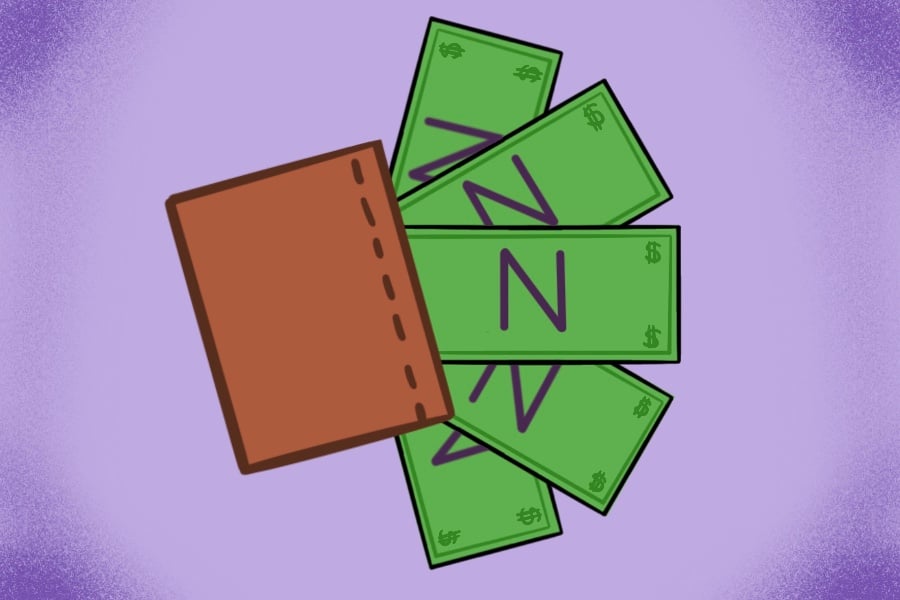Northwestern Graduate Workers present NU’s financial report, discuss alternative allocations
Northwestern Graduate Workers discussed University’s budget expenditures and incorporated union concerns at a Tuesday meeting.
February 16, 2022
Northwestern Graduate Workers analyzed NU’s financial report Tuesday while incorporating other employee rights organizations into the discussion.
In a presentation led by Ph.D. candidate and NUGW Research Committee Chair Andrew Montequin, workers informed attendees of the growing disparity between Ph.D. student stipends and NU’s endowment. NU’s primary reserve ratio, which compares how much the University can spend to the amount it actually does, skyrocketed in 2021, according to a chart Montequin presented at the event.
“For the 2021 fiscal year, its primary reserve ratio was about four and a half, so that means it has four and a half times more money on hand,” Montequin said. “The primary reserve ratio is way higher than what would be considered excellent.”
NU finished the 2021 fiscal year with a budget surplus of $87.8 million, and according to a Jan. 13 email from Executive Vice President Craig Johnson, the endowment reached $14.9 billion.
However, Montequin said the excess money NU could use for employee funding is often locked into new investments instead, resulting in systematic underspending.
“The top 29 paid employees (at NU) made over $30,000,000 … the last year was incredible for NU’s finances,” he said. “It’s basically huge pots of money that NU says they can’t draw from.”
Various representatives from labor rights organizations on campus spoke at Tuesday’s meeting on why their employees need financial support. Fifth-year interdisciplinary biological sciences student Julie Ming Liang, one of NUGW’s co-chairs, discussed improving the graduate workers’ “material working conditions” through higher wages and better benefits.
Liang said graduate workers do not have dental and vision insurance, and students shouldn’t have to pay the $2,000 insurance out-of-pocket maximum. She also suggested the installment of an emergency healthcare fund, better Counseling and Psychological Services support and higher compensation for students who do work outside of their pay grades.
“With this money … you could be recognized for the work you do outside of your research to make Northwestern better,” Liang said.
Overworked graduate workers are often unable to produce strong research and conduct their teaching assistant duties to the fullest extent, according to a comment by Weinberg Prof. Jorge Coronado, the president of the NU chapter of the American Association of University Professors.
SESP junior Neva Legallet, who represented Students Organizing for Labor Rights at the meeting, spoke on the organization’s goal to increase wage and health benefits for NU staff, ranging from dining hall workers to SafeRide drivers. She added SafeRide drivers in particular are severely overworked as there are not enough to serve an undergraduate student population of 8,000 with even more graduate students.
Northwestern University’s Library Workers Union has asked for compensation for lost wages and retirement savings, authority metadata librarian Jamie Carlstone said. These budget cuts were made during the pandemic despite the University’s large endowment.
“My pay is already falling behind where I was when I started,” Carlstone said. “NU has been asked to work with us now and negotiate the terms and conditions of our arguments, but we can’t say for sure when they’re going to fight for bargaining.”
Meeting attendees were asked to submit their recommendations for how to use NU’s endowment. Though representatives throughout the meeting brought up rising inflation rates and Evanston’s high cost of living, attendees also mentioned reducing therapy copays, forgiving student loans and subsidizing housing.
To implement budget reforms at NU, Ph.D. candidate and NUGW Solidarity Committee Chair Andrew Hull said engaging with the Board of Trustees would be integral. However, since the board is notoriously secretive, Hull said public pressure is the best way to ensure real change.
“The University is so grossly anti-democratic and inaccessible,” Hull said. “Which makes the need for democracy and democratic action like unions all the greater.”
Clarification: This article has been updated to more accurately reflect Liang’s statement about insurance out-of-pocket maximum.
Email: [email protected]
Twitter: @swarthout_iris
Related Stories:
— Northwestern Graduate Workers Supports graduate student in-person safety
— Northwestern Graduate Workers continue pushing for unionization, form group for disabled students












